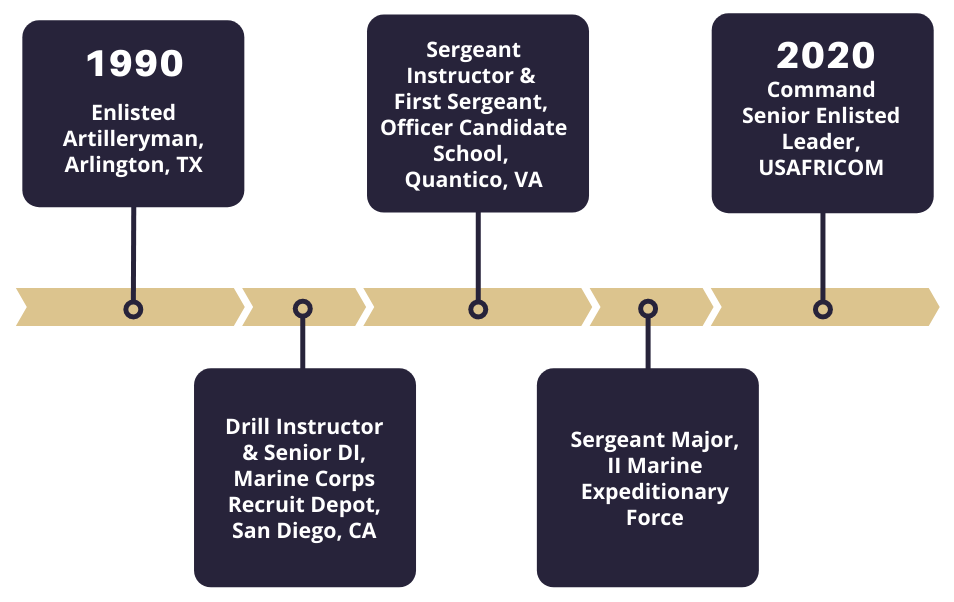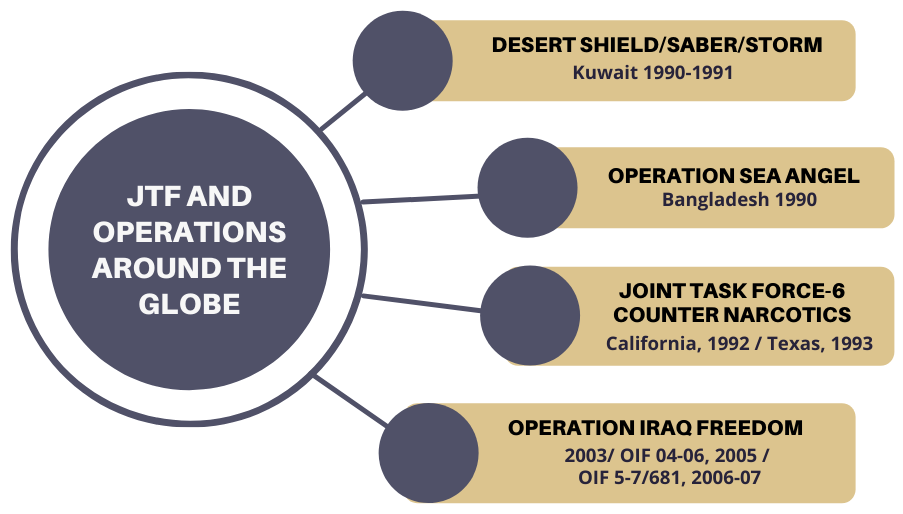The SEJPME Spotlight series recognizes and profiles current and former students serving in the Joint Interagency, Intergovernmental, Multinational (JIIM) environment or in named joint operations and exercises. This series aims to share SEJPME student or alumni experiences to inspire current students and provide an example for others to emulate. Individuals can be nominated for this distinction by the SEJPME Program Manager or their command senior enlisted leader (CSEL).
The first distinguished alumni, Sgt. Maj. Richard D. Thresher, command senior enlisted leader, U.S. Africa Command (USAFRICOM), career illustrates the value of Joint education.
What a Joint Career Looked Like for Thresher
During his 32+ year career, he has served in numerous capacities and has been a role model and advocate of lifelong learning.


Thresher has attended all levels of USMC Professional Military Education (PME), graduated from the National Defense University's Joint Forces Staff College, completed SEJPME and the National Defense University Keystone. He holds a bachelor's and master's degree from American Military University and a graduate-level certificate from East Carolina University.
Thresher shared his experiences and thoughts on the value of joint leader development.
The following is an edited version of our interaction.
What joint experiences have you had?
I think most of my experiences over the past two decades have been joint. Although this is my first joint assignment per true definition, everything we do involves joint operations. All of my tours in Iraq involved joint operations.
How has SEJPME, or more broadly, joint education, impacted your experiences in a joint environment?
SEJPME gave me the knowledge to find information and exposure to the joint operational environment! The course was also very instrumental in my preparation to attend the Joint Combined Warfighting School (JCWS). SEJPME provided the wave-tops of what to expect, how to understand the basics, and most importantly, where to find the information when you need it.
Tell us about an experience you've had where your SEJPME knowledge came into play.
USAFRICOM conducts a real-world operation that involves multiple 3-letter agencies, each with its own capabilities. When people get extremely busy in a high-stress situation, they often revert back to doing things they are best at or most comfortable doing. I recognized that our focus on the planning team was narrowing due to this human nature phenomenon. I quickly assessed the situation using the DIME-PMESII, which I learned in detail from the SEJPME course. I was able to pull back, re-assess and ensure that we were using all of our available assets to the best of their capabilities. This resulted in the team problem solving, using each other, vice only relying on their own experiences.
What is the most important thing you've learned about joint operations?
Two things. 1. We do not know as much about other services' capabilities as we should. This is a limitation. Therefore, we should share information and advertise what capabilities may exist that the decision-maker may not know. 2. You can't do it alone, and you must trust the recommendations from other service leaders. If a tanker is giving advice about tank employment, maybe you should take their advice!
What do you feel is the most important subject for future joint leaders to know?
Don't assume. Joint HQs are filled with very senior General Flag and Flag General Officers (GO/FO) and 06s. I see many planners and lower-ranking individuals assuming that these very senior leaders know what they know. For example, suppose you are a Marine MV22 pilot and you are briefing an Army GO/FO who is an infantryman on a concept of operation (CONOP) that involves aerial refueling but don't brief crew rest and aircraft limitations because you think the GO/FO knows what you know. In that case, you are not effectively providing all the information needed for that GO/FO to make a risk informed decision. Always brief the details. The GO/FO will let you know if you are briefing too much or not enough!
What advice do you have for current students?
Don't try to be an expert, detailed planner. Do your best as a student but learn where to find the information. You can always refer back to Joint publications at a later date, and there are plenty of experts in a joint command. Most important for SEJPME, do not take shortcuts! Take the course and ask questions. You may not use the information immediately, but if you stay in for a while, you will inevitably use this information.
What's next for you?
At the moment, retirement--unless something else pops ups. I've said since the day I enlisted that the Marine Corps would have to kick me out...three decades later, I'm still excited to serve!
What would we be surprised to learn about you?
I'm a wine aficionado with a few certifications to back up my advice and a few hundred bottles in my cellar!
We finished up by asking him if there was anything else he'd like to share?
SEJPME is a great opportunity to match education with experience for the enlisted force. If you get the opportunity to attend any joint course, you should take it, and everyone should take the SEJPME! The more senior you are, the more likely you will work jointly, so earlier exposure to the joint world will prepare you better! SEJPME provides that early exposure.
Today, Thresher appreciates the value of the enlisted JPME pipeline [joint learning continuum] and recognizes the vital role it played in his career and leader development.
The SEJPME program thanks Thresher for his willingness to be recognized. We are also very interested in taking a tour of his wine cellar (just kidding, sort of). Congratulations again!
If you are a CSEL interested in nominating an SEJPME student or alumni, please contact the Program Manager, Mr. John Lipps, at john.r.lipps.civ@mail.mil.